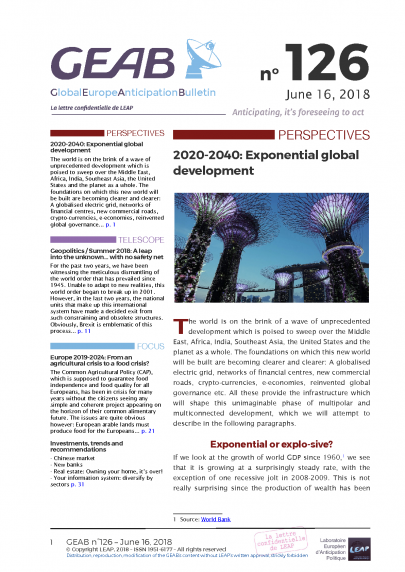GEAB 126

For the past two years, we have been witnessing the meticulous dismantling of the world order that has prevailed since 1945. Unable to adapt to new realities, this world order began to break up in 2001. However, in the last two years, the national units that make up this international system have made a decided exit from such constraining and obsolete structures. Obviously, Brexit is emblematic of this process. However, the phenomenon has accelerated a lot since that decision was made, as we shall see. Clearly, we are approaching a day of reckoning: Freed from their constraints, the nations are now floundering, with no fixed point in sight to cling to. We have already mentioned the risks of shakiness and panic reactions, potentially leading decision-makers to make bad decisions that are likely to produce dramatic chain reactions. We believe that this summer could see this kind of “accident”. Everything seems to be gathering together for a perfect storm.
RIP G7
In this ‘obituary of the old-world order’, let’s start with the G7 which Donald Trump has just shot down in flames, despite the laudable efforts that had been made by everyone.[1]
Our faithful readers know that we have been saying for a long time that the G7-8-7-6 does not make much sense and we won’t be shedding any tears over its death. In terms of their GDP, the top seven global powers are now China, the USA, India, Japan, Germany, Russia and Indonesia.[2] So that France, the UK and Canada did not slip out of the annals of global governance, among other reasons, the G20 was formed in 2008 from Argentina, Australia, Brazil, Canada, China, France, Germany, India, Indonesia, Italy, Japan, Mexico, Russia, Saudi Arabia, South Africa, South Korea, Turkey, UK, USA and the European Union[3]. However, this is an artificial exercise because, if we stick to the ranking of world powers according to their GDP, we should add Spain and the Netherlands to the list and exclude Argentina and South Africa.
Nelson Mandela’s country, particularly, is far behind the others, ranked 34th. Nevertheless, it seems appropriate to include an African country in the list and hence avoid overrepresentation of certain continents, such as Europe. One of the innovations was to have as a full member the EU, a non-national entity, making the G20 something new and different to the usual ‘international’ organisations. Given this logic, it is the African Union (with a 2,849 billion-dollar GDP), rather than South Africa (294 billion-dollar GDP), which should represent Africa. But, in 2008, the African Union wasn’t a very convincing regional entity – something which, as we have already seen, is now changing. ASEAN (with a $2.4 trillion GDP) would obviously have its place in this grouping, since the EU is entitled to be part of it…
To cut a long story short, what is important to understand is that, in a constantly changing world, it is difficult to create fixed multilateral fora which remain relevant and useful for a long time. Future models of global governance urgently need to incorporate ‘Agile’ principles,[4] just as everyone else already does.
Once the G7 was no longer a club of the great powers, it became a kind of ‘Western club’ – where the word ‘Western’ actually meant ‘allies of the United States’ in the mentality of a Cold War which itself was melting away. Adding Russia to this club in 1997 was, therefore, a beautiful symbol of the end of the Cold War. On the other hand, its exclusion in 2014, regenerated this mindset of confrontation among the allied powers (allied against whom, by the way?) – a bad omen.
Donald Trump is now challenging this mentality, hopefully as a long-term move. We must hope our leaders have something better to do than gather together in pointless summits that nurture tensions within the world. Considering the armadas of civil servants and diplomats that are mobilised in the preparation of these summits, the enormous organisational costs (605 million dollars, of which nearly 400 million alone was devoted to security, for hosting-Canada only[5]) and the precious time lost for Heads of State at a moment when they are dealing with particularly troubled times, Trump’s resounding outburst is not to be regretted. Neither are his just remarks about Russia’s absence,[6] followed by the cynical comments of Russian Foreign Minister Sergei Lavrov on the fact that he did not intend to return to the G7 and preferred to continue working through the much more appropriate format of the G20.[7]
If we are to hear about it again, let’s hope it’s in the context of a real reinvention! A transatlantic forum; a sub-group of the EU’s representative countries at the global level; what do we know…?
The only disturbing aspect of Trump’s challenge is the violence of the signal he is sending in the accelerated disintegration of past alliances, which, seemingly, are not being replaced.
A floundering European Union
The EU as we knew it, continues to disintegrate, though other patterns of cooperation are emerging – something we will talk about again further on. The difficulties the United Kingdom is meeting in concluding its exit don’t represent a victory for the EU.[8] As mentioned before, if the British cannot proceed with their democratic choice because it is made impossible, it is not the EU that will have won. Rather, it is democracy that will have lost, paving the way for political radicalisation – and not just across the Channel. The message will have been made clear: In a globalised world, the choices of (national) peoples are unachievable.
A moribund NATO
As we have explained on other occasions, NATO is still there, of course, but only because there are no better options at hand. Everyone wants to be rid of it – the Europeans who want a common European defence[9] and Donald Trump who wants Europeans to participate more in their own defence. They are all contributing to a slow process in which NATO continues to get in the way whilst Europeans dither between several strategies:
- To increase their share[10] and thus acquire an equal say with that of the US within NATO (with the long-term aim of separating off to form a European NATO[11]). Problem: For this strategy to have a chance of success, much greater cohesion is needed in the European camp – something that is still a long way off at the moment.
- To advance a European defence project beside NATO with the support of a few member countries and plan a gradual cessation of contributions to the Alliance prior to an organised exit. This strategy is currently more realistic, but likely to create greater tensions among Europeans on one hand, and between European and Americans on the other.[12]
- To Europeanise national armies, as some think Germany has been tempted to do.[13]
- To opt for the Russians, rather than the United States, as protectors! Whilst this option is provocative, we believe that including such a perspective may help towards a better understanding of the US-Russian confrontation in Europe. Russia has little interest in a Europe at war. In fact, even less than the distant United States. As with China in the South China Sea, they amass troops and armies on the border with Europe, probably not so much to attack as to defend themselves and to maintain peace within their vicinity. In the multipolar world of the twenty-first century, the United States will no longer be the only ‘cop’ in the world. And we believe that, even if they are in the minority, some Eastern European countries are beginning to think that, since a European defence still seems far away and since a US defence imposes a harmful confrontation with Russia, why not change umbrella after all? We are thinking of Hungary, of course, but also Greece, Italy and Austria. Clearly, we will not see any clear statement on this topic for a long time – and, hopefully, Europe will find more adult ways to protect itself before then. But with this idea in mind, we can better understand certain events, such as the meeting between Putin and Van der Bellen in Vienna on 6th June,[14] or that between Putin and the Bulgarian president,[15] both referring to ‘strategic’ links … in the energy sector, at the very least. After all, changing umbrella is exactly what Turkey did![16]
Whilst waiting for the EU to find a way to decide, the moribund NATO is brooding one last ember…
From the Gulf Cooperation Council to the Saudi-Emirati Coordination Council Login

The world is on the brink of a wave of unprecedented development which is poised to sweep over the Middle East, Africa, India, Southeast Asia, the United States and the [...]
The Common Agricultural Policy (CAP), which is supposed to guarantee food independence and food quality for all Europeans, has been in crisis for many years without the citizens seeing any [...]
- Chinese market - New banks - Real estate: Owning your home, it's over! - Your information system: diversify by sectors Chinese market China has an instrumental role in the [...]

Comments